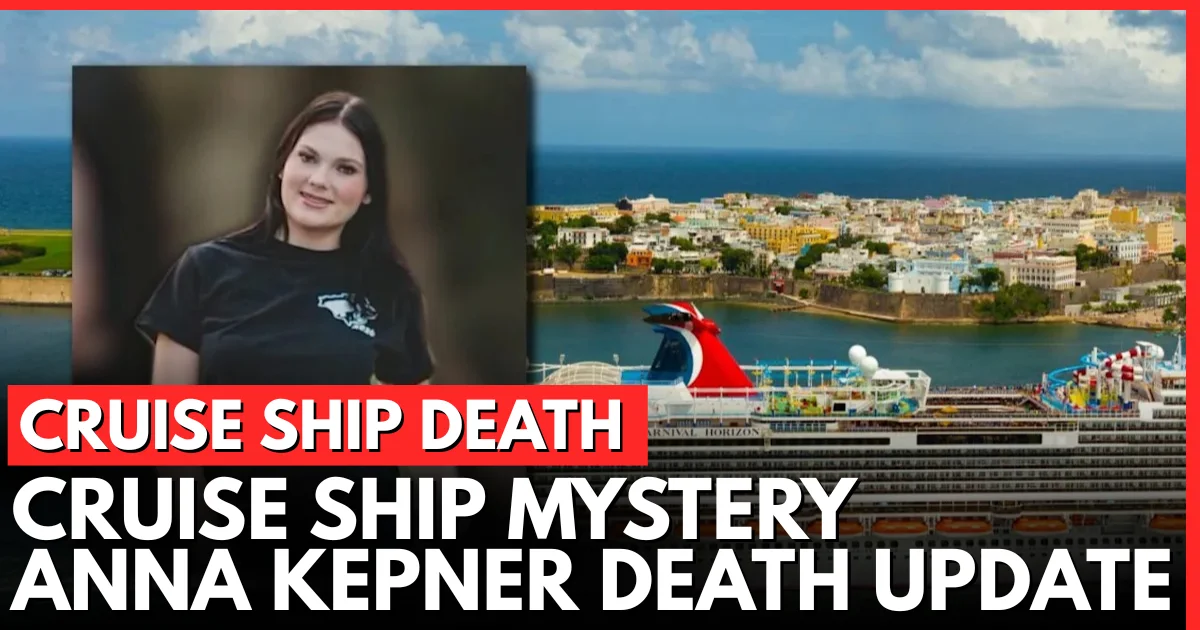The tragic death of Anna Kepner aboard a cruise ship has sparked questions and investigations. Here’s everything we know about this developing case. Read more.
Table of Contents
Anna Kepner Cruise Ship Death: Everything We Know About This Tragic Case
A vacation meant for relaxation ended in unimaginable tragedy. Anna Kepner’s death aboard a cruise ship has left her family devastated and the public searching for answers. As investigations continue, here’s what we currently know about this heartbreaking case.
Who Was Anna Kepner?
Anna Kepner was an American woman whose life ended tragically during what should have been an enjoyable cruise vacation. Her death has garnered significant attention as details slowly emerge.
Family and friends have described Kepner as someone who cherished life’s experiences. Like millions of Americans annually, she chose cruising as a way to travel and explore.
Her unexpected death has transformed a routine vacation into a nightmare for loved ones left behind seeking answers.
The Circumstances of Her Death
Details surrounding Anna Kepner’s death remain subject to ongoing investigation. What we know comes from limited official statements and family accounts.
Key facts established so far:
| Detail | What We Know |
|---|---|
| Location | Death occurred aboard a cruise vessel |
| Timeline | Incident happened during the voyage |
| Initial response | Ship personnel responded to the emergency |
| Authorities notified | Relevant investigative agencies informed |
| Family notification | Next of kin received tragic news |
Specific circumstances leading to her death remain under investigation. Authorities have been careful about releasing information while inquiries proceed.
How Cruise Ship Deaths Get Investigated
When passengers die aboard cruise ships, complex jurisdictional questions arise. Multiple agencies may become involved depending on circumstances.
Potential investigating entities include:
- FBI — Handles crimes aboard vessels in international waters
- Coast Guard — Investigates maritime safety issues
- Flag state authorities — Country where ship is registered
- Port state officials — Nation where vessel docks
- Local law enforcement — If death occurs in territorial waters
This jurisdictional complexity sometimes frustrates families seeking quick answers. Investigations can span multiple agencies and nations.
Cruise lines conduct their own internal reviews simultaneously. These corporate investigations run parallel to official inquiries.
The Family’s Search for Answers
Anna Kepner’s loved ones face an agonizing wait for information. Families in similar situations often describe feeling powerless and frustrated.
Common challenges grieving families encounter include:
- Limited communication — Cruise lines often restrict information sharing
- Jurisdictional confusion — Unclear which authorities lead investigations
- Geographic barriers — Incidents occur far from home
- Legal complexity — Maritime law differs from land-based cases
- Evidence preservation concerns — Worry about information being lost
Families frequently retain attorneys specializing in maritime law to navigate these challenges. Legal representation helps ensure their interests receive proper attention.
Cruise Ship Safety Under Scrutiny
Every cruise ship death renews public focus on passenger safety. The cruise industry serves millions of travelers annually, and serious incidents remain statistically rare.
However, when tragedies occur, questions inevitably arise:
Safety infrastructure concerns:
- Are emergency response protocols adequate?
- Do ships carry sufficient medical personnel?
- How quickly can passengers reach shore-based hospitals?
- Are safety drills taken seriously by passengers and crew?
Security considerations:
- How well do cruise lines screen passengers and crew?
- What surveillance systems monitor passenger areas?
- Are incident reporting procedures followed properly?
- Do language barriers affect emergency response?
The cruise industry maintains that safety remains paramount. Critics argue more oversight and transparency are needed.
What Rights Do Cruise Passengers Have?
Americans boarding cruise ships should understand their legal protections. Maritime law creates a unique framework that differs significantly from land-based incidents.
Key legal considerations include:
| Issue | Reality |
|---|---|
| Lawsuit filing location | Cruise tickets often mandate specific jurisdictions |
| Time limitations | Shorter deadlines than typical injury cases |
| Liability limitations | Contracts may restrict recoverable damages |
| Evidence access | Cruise lines control most documentation |
| Witness availability | Crew members may be difficult to locate |
Passengers rarely read the lengthy terms and conditions accompanying ticket purchases. These documents significantly affect legal rights if problems arise.
Travel insurance policies also vary widely in coverage. Understanding policy limitations before traveling proves essential.
The Cruise Industry Response
Cruise lines typically express condolences when passenger deaths occur while limiting detailed public comments. This approach balances compassion with legal caution.
Standard cruise line responses include:
- Sympathy statements — Expressing condolences to affected families
- Cooperation pledges — Promising to assist official investigations
- Privacy invocations — Declining detailed comment citing ongoing inquiries
- Policy affirmations — Emphasizing commitment to passenger safety
Critics argue this approach prioritizes corporate protection over transparency. Industry defenders maintain that premature statements could compromise investigations.
Broader Implications for Cruise Travelers
Anna Kepner’s death reminds potential cruisers that vacations carry inherent risks. While serious incidents remain uncommon, travelers should prepare appropriately.
Recommendations for cruise passengers:
- Purchase comprehensive travel insurance — Ensure coverage includes medical evacuation and repatriation
- Research cruise line safety records — Some companies maintain better records than others
- Understand medical limitations — Ships offer limited medical capabilities compared to hospitals
- Attend safety drills seriously — Know emergency procedures before incidents occur
- Keep emergency contacts accessible — Ensure family knows how to reach you
These precautions cannot prevent all tragedies. However, preparation helps travelers and families respond more effectively when problems arise.
What Happens Next in This Case
The investigation into Anna Kepner’s death will continue through established processes. Several developments may occur in coming weeks and months.
Anticipated next steps:
- Autopsy completion — Medical examination determining cause of death
- Witness interviews — Statements from passengers and crew present
- Evidence review — Examination of surveillance footage and documentation
- Official reports — Formal findings from investigating agencies
- Potential legal action — Family may pursue civil claims
Timelines for these processes vary considerably. Complex cases sometimes require months or years for full resolution.
The Human Cost Behind Headlines
Behind every cruise ship death statistic lies a human being with family, dreams, and a life cut short. Anna Kepner’s story represents more than a news headline.
Her death reminds us that travel always involves accepting certain risks. Most journeys end safely, but tragedies do occur despite best precautions.
For Kepner’s family, the focus remains on understanding what happened and ensuring proper accountability. Their grief continues regardless of investigation timelines.
FAQs
What happened to Anna Kepner on the cruise ship?
Anna Kepner died aboard a cruise ship under circumstances that remain under investigation. Authorities have not released complete details about the incident while official inquiries continue. Her family awaits answers about what led to this tragic outcome.
Who investigates deaths that occur on cruise ships?
Multiple agencies may investigate cruise ship deaths depending on circumstances and location. The FBI handles crimes in international waters, while Coast Guard examines safety issues. Flag state authorities, port officials, and local law enforcement may also become involved.
What legal rights do families have when someone dies on a cruise?
Families may pursue wrongful death claims under maritime law, though cruise ticket contracts often impose specific limitations. These include designated court jurisdictions, shortened filing deadlines, and potential damage caps. Consulting a maritime attorney helps families understand their options.
How common are deaths on cruise ships?
Serious incidents aboard cruise ships remain statistically rare given millions of annual passengers. However, deaths do occur from various causes including medical emergencies, accidents, and occasionally criminal acts. Exact statistics vary by reporting methodology and time period.
Should travelers reconsider cruising after incidents like this?
Individual risk tolerance varies among travelers. Cruising remains popular and generally safe for most passengers. However, travelers should purchase appropriate insurance, research cruise lines, understand medical limitations aboard ships, and prepare for emergencies before sailing.
Conclusion
The death of Anna Kepner aboard a cruise ship has left her family seeking answers that may take considerable time to obtain. Investigations continue through complex processes involving multiple jurisdictions and agencies.
Her story highlights both the joys and risks inherent in travel. While millions cruise safely each year, tragedies remind us that preparation and awareness matter.
As more information emerges, the full picture of what happened to Anna Kepner will gradually become clearer for her loved ones and the public.
Follow our coverage for updates on this developing story. Share your thoughts and condolences in the comments below.

